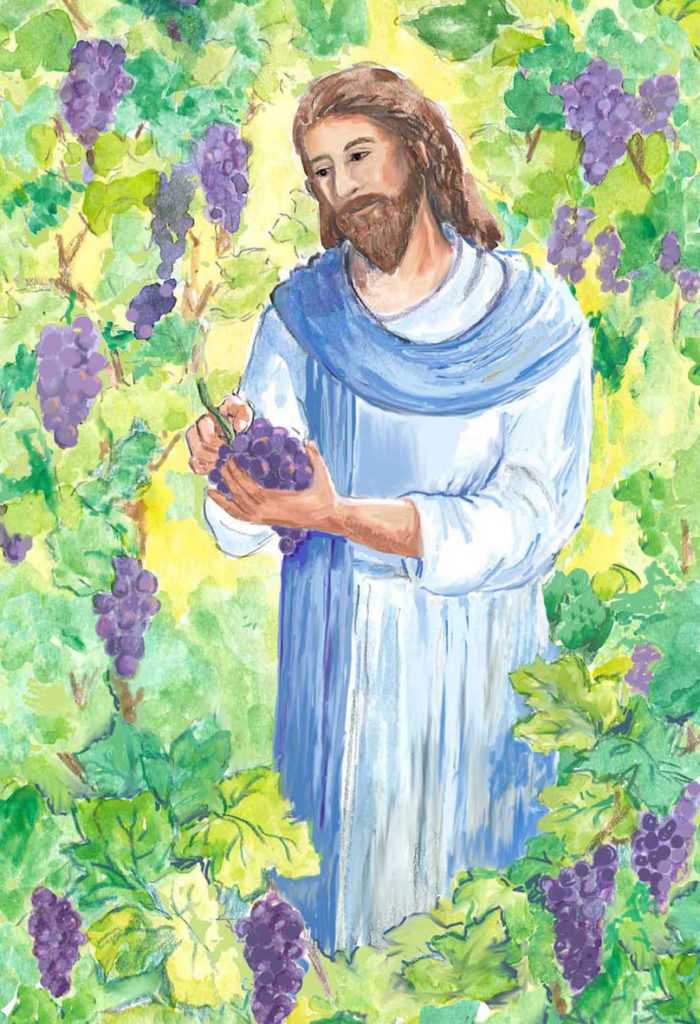Readings: Acts 8:26–40 | 1 John 4:1–21 | John 15:1-8
Hymn of the Day: LSB 540 Christ, the Word Incarnate
Text: John 15:1-8
If last Sunday has the popular name, Good Shepherd Sunday, then perhaps a good name for this would be “Christ the Vine Sunday.” Today, the picture of a vine growing and branching out gives us a complete picture of Christ with His Church. Far from the human idea that the Church is just an association of likeminded people or (as atheists say) those who are gullible enough to share a myth. The Church is the living witness of the living Christ, against whom even the gates of hell could not prevail.
Christ is with His Christians, and His Christians are with Him. What an amazing thought, and it reassures a believing heart who has trusts what He says, “Behold, I am with you always, even to the end of the age.” (Matt. 28:20)

Yet with Christ described as the True Vine, and we as the branches, there are also some serious lessons here:
First, our Lord tells us, “every branch that does bear fruit he prunes, that it may bear more fruit.” It’s easy to measure our life by how many good things are happening to us, and how we are able to help others. When hard times happen, we pray that they would quickly pass, so we can get back to having a good life and being able to be useful.
But then our Father the vinedresser comes in and messes up our plans. Family drama comes in and wrecks a holiday meal. We have great plans to help out a friend, and it gets thrown to the wind because of illness. Just when everything seems to be settling down, we find out the cancer has come back…again. God! Why would you let these things keep happening? We might want to exonerate God and blame the devil instead, but does that mean God was sleeping on the job and missed what was going on?
“Every branch that does bear fruit he prunes, that it may bear more fruit.” It’s not that the devil for a moment won the wrestling match over your life, or that God is punishing you for something. You are a branch in the True Vine of Christ, and those fruitful vines—according to His wisdom—He prunes. It doesn’t make immediate sense, but pruning actually stimulates new and healthier growth.

The paradox of the Christian is that trials actually produce a stronger faith and more fervent love for the Lord and love for others. The country club notion of church will tell you we come together to be reminded of our values, sing songs we like together, and keep ourselves on the straight and narrow so that no disaster happens to us. But, mysteriously, it’s actually among sinners who are pressed hard that God is at work making His Church grow. Both St. Paul and St. James describe this in their epistles:
3 Not only that, but we rejoice in our sufferings, knowing that suffering produces endurance, 4 and endurance produces character, and character produces hope, 5 and hope does not put us to shame, because God’s love has been poured into our hearts through the Holy Spirit who has been given to us. (Rom. 5:3-5)
And, “2 Count it all joy, my brothers, when you meet trials of various kinds, 3 for you know that the testing of your faith produces steadfastness. 4 And let steadfastness have its full effect, that you may be perfect and complete, lacking in nothing.” (James 1:2-4)

It’s through the trials, the setbacks, the weakness that God our Father makes us grow in Christ. It may be our pride needs to be humbled, or our trust needs to be firmed up, or we need to be more merciful toward others or be the recipients of charity. Whatever His purpose, He is the One who is always in control, directing what happens, “working all things for good for those who are called according to His purpose,” [Rom. 8:28] and preparing His Christians to bear more fruit.
The Lord picked this image of a vine for a reason. Grapevines are not trees. Trees, you want to grow tall and sturdy. That’s the image at work in Psalm 1, “He is like a tree planted by streams of water that yields its fruit in its season, and its leaf does not wither.” (v. 3) But old growth on grapevines does not bear fruit. Only the year-old branches which have been pruned and been through a season will produce fruit. That’s the lesson here: That we must be pruned and tended diligently by God to bear fruit for Him.
This fruit is only possible through Christ. So, He continues in the Gospel,
3 Already you are clean because of the word that I have spoken to you. 4 Abide in me, and I in you. As the branch cannot bear fruit by itself, unless it abides in the vine, neither can you, unless you abide in me. 5 I am the vine; you are the branches. Whoever abides in me and I in him, he it is that bears much fruit, for apart from me you can do nothing.

So, we’ve heard what God the Vinedresser is able to accomplish in the vines of His Son—those who have their life from Christ in the saving waters of Baptism and the nourishment which His Body and Blood gives. This is what it means to be “clean because of the Word that I have spoken to you.” But it’s also possible that on account of the trials and temptations of life, or an unhealthy fascination with what we think are acceptable fruits—that we are no longer abiding in the Vine.
“Apart from me you can do nothing” – What a harsh absolute statement! But it’s true. Branches don’t live on their own. Anyone who’s cut flowers or had a fresh Christmas tree knows this. Neither can someone remain a Christian without abiding in Christ. This isn’t as simple as considering what we do, as if to say all you need to do is go to church to remain a Christian. Yet at the same time, He warns us, 6 If anyone does not abide in me he is thrown away like a branch and withers; and the branches are gathered, thrown into the fire, and burned.
Whoever willfully refuses to abide in Christ is in deadly danger! But very few of us would actually say we’re refusing to abide in Christ. Sometimes it’s believing in some idea of Jesus without hearing what His Word says or retranslating it through your own standards. Other times it takes the form of avoiding the assembly of believers because of human disagreements. Still other times, it’s being so enamored with being busy with good works that you don’t know or care what the church teaches. With all of these, there is the risk of a fate worse than death: not abiding in Christ, of being cut off and thrown into the fire and burned. Even if you consider yourself a Christian, if you do not abide in Christ through faith, you will go to hell.

Here the picture of the vine is also helpful, because the old growth is incapable of producing fruit. That is, someone whose faith has not be exercised by trials, and someone who considers that they’re a Christian because they’ve grown up in church. Old, barky growth does not produce the fruits of faith, and it must be pruned or taken away to be burned.
So our Lord is reminding and admonishing us because we are His living branches. He teaches us to expect the trials as the means of our bearing much fruit, and He warns us about the dangers of complacency.
But now hear the great joy for His well-tended, fruitful branches:
7 If you abide in me, and my words abide in you, ask whatever you wish, and it will be done for you. 8 By this my Father is glorified, that you bear much fruit and so prove to be my disciples. 9 As the Father has loved me, so have I loved you. Abide in my love.

What joy there is in not only having a fiction of Christ, but having the Lord Himself with His Word! That person who abides with simple trust in His Word has these great blessings! For starters, He gives us a clean heart before Him, but then adds to that the privilege of prayer! How great would it be if there was a group of people on earth who had access to the King of Creation? These, who could appeal to Him on behalf of those who have forsaken the faith, who could ask Him not just for private benefits but for the calling of all people and carried out in the mission of the Church; who, seeing the twisted direction of our age would not simply ask for a return to the good-old-days, but for His Kingdom to be victorious over all the powers of darkness in the present age.
And that is precisely what Jesus is saying His Christians are. As Christ abides in us and we in Him, God is glorified by the fruits His people bear.
“As the Father has loved me, so have I loved you. Abide in my love.” In this Christian Church is where genuine love is made known. We abide in the forgiveness of sins—ours and those whom we also forgive. We abide in God’s love for all people of every nation, appearance, class, and ability. We abide in Christ, whose authority over heaven and earth is able to make disciples of all, and bring the branches of His living Vine through the temporal trials to eternity He has prepared for us. Amen.


